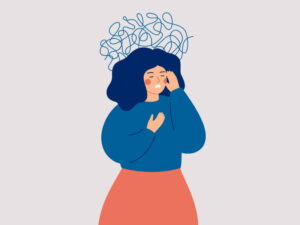Anxiety, a feeling often equated with apprehension, fear, or nervousness, is a natural reaction to stressors in our environment. However, when anxiety becomes overwhelming and immediate, it is termed as ‘acute’. Acute anxiety can strike without warning, often in response to particular triggers, and can be a paralyzing experience for the sufferer. In this guide, we delve deep into the warning signs of acute anxiety, and the most effective acute anxiety treatment options available today.
Contents
When To Seek Acute Anxiety Treatment?
 Acute anxiety, unlike its more persistent counterpart, chronic anxiety, strikes suddenly and intensely, often resembling a panic attack. While everyone may experience anxiety from time to time, acute anxiety can be particularly disruptive and distressing. Here’s a guide to understanding when it’s time to seek help for acute anxiety:
Acute anxiety, unlike its more persistent counterpart, chronic anxiety, strikes suddenly and intensely, often resembling a panic attack. While everyone may experience anxiety from time to time, acute anxiety can be particularly disruptive and distressing. Here’s a guide to understanding when it’s time to seek help for acute anxiety:
- Severe Physical Symptoms
If you experience intense physical symptoms like chest pain, heart palpitations, shortness of breath, dizziness, or fainting, it’s crucial to first rule out any medical conditions. If these symptoms frequently recur and are associated with anxiety, it’s time to seek help.
- Interference with Daily Activities
When anxiety starts affecting your day-to-day activities – be it work, school, or social commitments – it’s an indication that you might need professional intervention.
- Avoidance Behavior
If you find yourself avoiding certain places, situations, or people due to fear of triggering an anxiety episode, this avoidance can restrict your life and indicate a need for treatment.
- Duration of Symptoms
While acute anxiety might be short-lived if you find that your symptoms linger, recur frequently, or even intensify over time, it’s a sign to seek help.
- Distressing Thoughts
Experiencing recurrent fears of impending doom, feeling out of control, or having intrusive thoughts are strong indicators that you should consult a professional.
- Substance Use
If you find yourself using alcohol, drugs, or medications to cope with or numb your anxiety, this is a sign of a deeper issue that needs addressing.
- Past Trauma
Events from the past, such as accidents, abuse, or any form of trauma, can trigger acute anxiety. If you find your anxiety linked to past events, it’s essential to seek specialized trauma-informed care.
- Feeling Overwhelmed
If you feel like you can’t cope or manage the anxiety on your own, or if you feel isolated and believe that nobody understands your experience. Then, these are signs that you might benefit from professional support.
- Suicidal Thoughts
Any thoughts of harming oneself or suicidal ideation are serious and require immediate attention. If this occurs, seek emergency care or a mental health professional immediately.
If your intuition suggests that the anxiety you’re experiencing isn’t typical for you, or if it’s causing significant distress, seeking professional help can be a step toward managing your symptoms effectively.
What Is The First Line Of Treatment For Acute Anxiety?
 The first line of treatment for acute anxiety typically involves a combination of immediate coping mechanisms, psychological support, and sometimes medication. Here is a detailed breakdown of the initial steps in treating acute anxiety:
The first line of treatment for acute anxiety typically involves a combination of immediate coping mechanisms, psychological support, and sometimes medication. Here is a detailed breakdown of the initial steps in treating acute anxiety:
1. Immediate Coping Mechanisms
- Grounding Techniques: Immediate grounding techniques such as focusing on one’s breath, engaging the senses (5-4-3-2-1 technique), or muscle relaxation can help to manage acute symptoms of anxiety.
- Safe Space: Helping the individual find a quiet, safe space where they can feel more in control can also be beneficial.
2. Psychological Support
- Crisis Counseling or Therapy: In acute cases, immediate crisis counseling or therapy can help individuals navigate through their intense anxiety and find relief.
- Cognitive-Behavioral Therapy (CBT): For ongoing management, CBT is often the first line of psychological treatment recommended for anxiety disorders, as it helps individuals identify and change negative thought patterns and behaviors.
3. Medication
- Short-acting Benzodiazepines: In some severe cases, especially when the anxiety is debilitating, healthcare providers might prescribe short-acting anxiolytics like benzodiazepines for immediate relief. However, these are typically used as a last resort due to their risk of dependence and other side effects.
- Beta-blockers: They can be used to control the physical symptoms of anxiety such as trembling or heart palpitations.
Identifying and addressing acute anxiety promptly is crucial. Lifestyle modifications and long-term therapy can also aid in managing anxiety symptoms more effectively in the long run, reducing the risk of recurrence. Always consult with a healthcare or mental health professional for an accurate diagnosis and treatment plan.
What Are Some Effective Acute Anxiety Treatment Options?
There are a variety of acute anxiety treatment options that can provide relief. Here’s a breakdown of some effective acute anxiety treatments:
Behavioral and Psychological Therapies
Behavioral and psychological therapies have long been cornerstones in the treatment of anxiety. Among the most prominent is Cognitive-Behavioral Therapy (CBT), a structured approach that seeks to alter negative thought patterns, behaviors, and emotional responses associated with anxiety. By challenging these negative patterns, individuals can reframe their perspectives and develop healthier coping mechanisms.
Exposure therapy, another effective strategy, is primarily used for individuals with phobias or PTSD. It involves a systematic and gradual exposure to the feared situation or object. Acceptance and Commitment Therapy (ACT), meanwhile, emphasizes mindfulness and acceptance strategies, enabling individuals to live and behave in ways consistent with personal values while developing psychological flexibility.
Alternative and Complementary Therapies
Mindfulness and meditation, for instance, are tools that teach individuals to anchor themselves in the present moment, offering a respite from the whirlwind of anxious thoughts. By focusing on the here and now, individuals can observe their feelings without judgment, reducing the intensity of their anxious reactions. Deep breathing and relaxation techniques can be instrumental in counteracting the body’s fight-or-flight response.
Through controlled and deliberate breathing patterns, individuals can activate their body’s natural relaxation response. Another promising avenue is biofeedback and neurofeedback. This utilizes electronic monitoring to relay information about the body’s physiological processes. By becoming more aware of these processes, individuals can learn to enact subtle changes, promoting relaxation and mitigating anxiety.
Lifestyle Changes
 Anxiety doesn’t operate in a vacuum; often, our daily habits can significantly influence its intensity and frequency. Regular physical exercise, for instance, is more than just a boon for physical health. Rather, it’s also a powerful antidote to anxiety. Engaging in consistent physical activity can trigger the release of endorphins, neurotransmitters that act as the body’s natural painkillers and mood elevators.
Anxiety doesn’t operate in a vacuum; often, our daily habits can significantly influence its intensity and frequency. Regular physical exercise, for instance, is more than just a boon for physical health. Rather, it’s also a powerful antidote to anxiety. Engaging in consistent physical activity can trigger the release of endorphins, neurotransmitters that act as the body’s natural painkillers and mood elevators.
Stimulants like caffeine can exacerbate anxiety symptoms, while depressants like alcohol can interfere with sleep patterns and mood, potentially intensifying feelings of anxiousness. Speaking of sleep, maintaining proper sleep hygiene is paramount. A consistent sleep schedule, a comfortable sleep environment, and adequate sleep durations can significantly reduce susceptibility to acute anxiety episodes.
Support Groups
The power of community cannot be overstated in the context of managing and overcoming acute anxiety. Support groups provide a safe haven where individuals can share their experiences, challenges, and successes with others facing similar struggles. These groups foster a sense of belonging and understanding, reminding participants that they are not alone in their journey.
Engaging in open dialogues about anxiety can provide valuable insights, new coping techniques, and a broader perspective. Moreover, the act of sharing and listening in a supportive environment can be therapeutic in itself, helping individuals process their feelings and gain confidence in their ability to manage their anxiety.
Acute anxiety can be overwhelming. However, there are numerous acute anxiety treatment options available. It’s essential to find what works best for the individual. Consulting with mental health professionals can help pinpoint the most effective strategies for managing and overcoming acute anxiety.
How Can I Prevent Acute Anxiety?
 Certainly! Here are some strategies and suggestions to help prevent acute anxiety:
Certainly! Here are some strategies and suggestions to help prevent acute anxiety:
1. Education
Understanding anxiety is the first step to mastering it. By learning about the symptoms, causes, and physiology of anxiety, you can gain a sense of control over it. Knowledge can reduce the fear of the unknown and help you be proactive in managing potential triggers.
2. Establish a Routine
A predictable daily routine can provide a feeling of normality. Knowing what to expect in your day can reduce potential stressors. This includes regular meal times, bedtime, and periods of relaxation or leisure.
3. Limit Stimulants and Sugar
Certain foods and beverages can act as stimulants and may trigger or exacerbate anxiety. These include items with high caffeine content like some teas, coffees, and chocolates, as well as sugary foods and drinks.
4. Limit News and Social Media Consumption
Being constantly connected or continually updated on global events, especially negative ones, can be a source of anxiety. Designate specific times in the day to check news or social media and avoid excessive exposure.
5. Time Management
Procrastination can lead to increased stress and anxiety. By managing your time efficiently and setting realistic goals for tasks, you can reduce last-minute rushes and associated stress.
6. Develop Healthy Boundaries
This can be in relationships, at work, or with technology. Setting limits can prevent feeling overwhelmed or overextended, which can trigger acute anxiety episodes.
7. Stay Connected
Maintaining close personal ties with friends and loved ones can be a source of support and grounding. These connections can act as a buffer against acute anxiety.
8. Engage in New Activities
Trying out new hobbies or learning new skills can act as a diversion, reduce boredom, and provide a sense of accomplishment, all of which can counteract feelings of anxiety.
9. Stay Hydrated
Dehydration can sometimes exacerbate symptoms of anxiety. Ensure you’re drinking enough water throughout the day.
10. Mindset and Perspective
Focusing on positive affirmations, maintaining an attitude of gratitude, and trying to view challenges as opportunities for growth can shift your mindset and reduce instances of acute anxiety.
Remember, while these strategies can help in prevention, they aren’t foolproof. Everyone’s triggers and thresholds for anxiety are different. It’s essential to find what combination of techniques works best for you.
Conclusion
In the multifaceted journey of understanding and managing acute anxiety, knowledge is both a shield and a guide. From behavioral therapies and lifestyle adjustments to embracing community support, there are numerous paths to overcome this condition. While each individual’s experience with anxiety is unique, the shared goal remains: cultivating resilience, understanding, and balance in the face of life’s uncertainties.
By arming oneself with preventive techniques and being open to professional help, one can confidently stride toward a life anxiety-free. If you are experiencing anxiety-related issues, Online Anxiety Counseling in India at TherapyMantra can help: Book a trial Online therapy session


